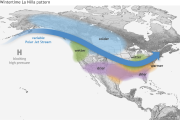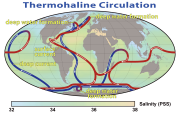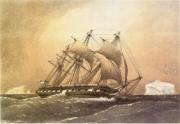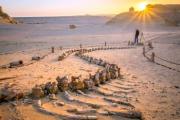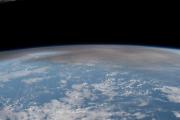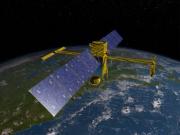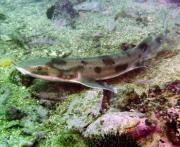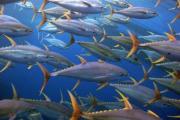Radio Program
Our regular Science and the SeaTM radio program presents marine science topics in an engaging two-minute story format. Our script writers gather ideas for the radio program from the University of Texas Marine Science Institute's researchers and from our very popular college class, Introduction to Oceanography, which we teach to hundreds of non-science majors at The University of Texas at Austin every year. Our radio programs are distributed at to commercial and public radio stations across the country.
Few things are worse than a guest who just won’t leave. And lately, that appears to be the case with La Niña—a period of cooling in the Pacific Ocean that brings nasty climate conditions to much of the United States. There are indications that La Niñas are becoming more common and staying longer. In fact, the winter of 2023 is bringing a “triple-dip” La Niña—only the third since scientists began tracking the phenomenon, in 1950.
When the fish markets of Chennai, India, process the daily catch, there are lots of leftovers: tails, fins, guts, and other parts—as much as a quarter to half of the entire catch. Those parts typically are dumped at the shoreline for the tide to sweep away. But the tide returns a lot of the debris to shore, where it attracts insects, dogs, and other scavengers. And it makes the shore smelly and unsanitary.
The Labrador Sea—a narrow body between Canada and Greenland—has been described as one of the “lungs” of the deep ocean. It absorbs oxygen from the atmosphere and deposits it deep below the surface. There, it enters a current that carries it into the North Atlantic Ocean, providing much of the oxygen that sustains life. And a recent study revealed new details about this process.
We’re all familiar with RNA viruses—or at least their effects. They cause colds, flu, measles, mumps—and COVID-19. So, you might not be thrilled to learn that scientists recently discovered 5500 new species of them in the world’s oceans. Many of them are so different from other species that the scientists have recommended adding some new branches to the virus “family tree.”
These viruses encode their genetic material not in DNA, as humans do, but in RNA—a material that’s similar to DNA but not quite the same.
HMS Challenger set sail from England to study the world’s oceans on December 7th, 1872. Its accomplishments were so massive that it took 23 years and 30,000 pages to publish them all. Yet the job isn’t finished even now. Scientists look at its results to teach us how the oceans have changed in the 150 years since it headed out to sea.
Phiomicetus anubis would make a great subject for a science-fiction movie. Named for Egypt’s jackal-headed god of death, it was about 10 feet long, weighed about 1300 pounds, and had long, powerful jaws full of sharp teeth.
More important for science, it could travel across land and through the sea. That’s because it was one of the earliest species of whales. It was making the transition from land to the oceans—more than 40 million years ago.
What a volcano gives, it can also take away. Consider the tiny Pacific islands of Hunga Tonga and Hunga Ha’apai. They were built by an underwater volcano named for the islands. An eruption in 2015 built new land that connected them.
But a spectacular eruption in 2022 blasted away not only the new land, but much of the two islands. It may have been the most powerful eruption since the island of Krakatoa was blasted to bits in 1883. And its effects were felt around the entire planet.
For years, NASA’s mantra for exploring Mars has been “follow the water.” Places with water are the best homes for life, so probes have been looking for traces of water on the planet—past or present.
The agency is getting ready to “follow the water” on Earth in a big way, too. A new mission will study the water across almost the entire planet—the first time that’s been done in a single mission. It’ll map rivers and lakes, and plot tiny changes in the height of the oceans—a measurement that can help scientists understand the role of the oceans in climate change.
A shark’s eyes can be scary—even if the shark is asleep. A recent study found that one species of shark appears to keep its eyes open about a third of the time it’s asleep. That could make predators think twice about going after the shark.
Researchers studied the draughtsboard shark, which is found around New Zealand. It’s typically about three feet long, and has a wide, flat body and a big mouth. When it’s threatened, it can suck in water or air to make it look bigger and more dangerous. And it can make a sound like a barking dog.
Bigger isn’t always better. A recent study, for example, suggests that big fish may have a tougher time adapting to the warming oceans. They might move to more comfortable waters more slowly than smaller fish, leaving them with less to eat and reducing their numbers.
Researchers used computer models of 450 different combinations of big predator fish and their smaller prey. Each model simulated the interactions of up to 200 different species to see how different combinations might react to climate change over the next 200 years.

